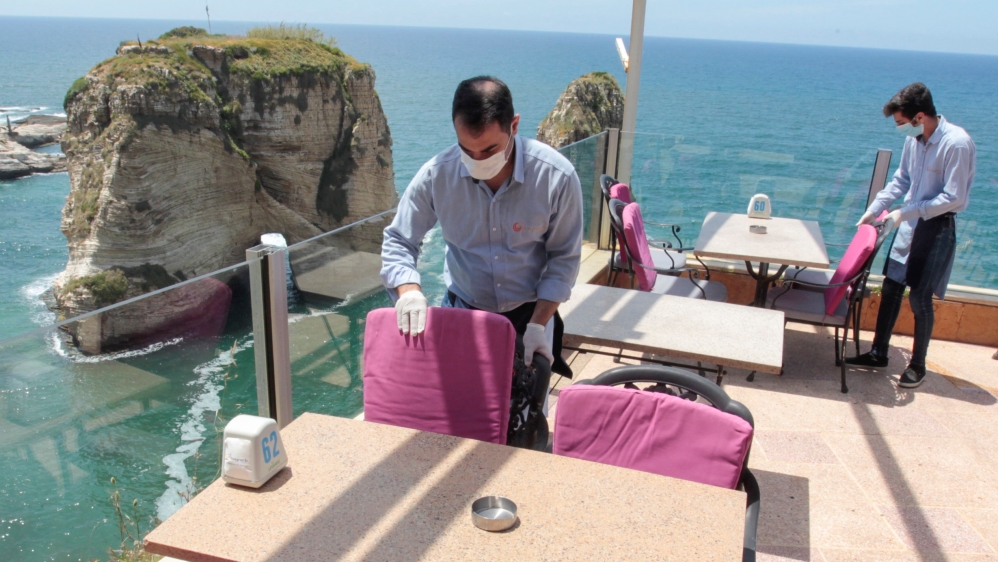Lebanon’s restaurants ‘sinking’ after coronavirus lockdown
Many eateries set to remain closed despite an easing of COVID-19 restrictions in the crisis-hit nation.

Beirut, Lebanon: “The main title of this phase is flexibility,” says Walid Merhi, resting on a barstool in his small restaurant and pub, Ferdinand, in Beirut’s once-bustling Hamra neighbourhood.
“Yes, coronavirus was bad, but the main problem is the financial issue. People have no purchasing power any more,” he tells Al Jazeera.
Keep reading
list of 4 itemsMexico’s teachers seek relief from pandemic-era spike in school robberies
‘A bad chapter’: Tracing the origins of Ecuador’s rise in gang violence
Why is the US economy so resilient?
Behind him, employees filter a maroon liquid from a metal container through a make-shift sieve into cups for takeaway orders. Cocktails-to-go seem out of place for a bar widely regarded as among the best in Lebanon.
But as the country is rocked by its worst-ever financial crisis, which has only deepened in the wake of a nationwide lockdown to curb the spread of COVID-19, everyone is being forced to adapt.
Ferdinand’s path is one taken by many restaurants in Lebanon as the country eases a near two-month lockdown that helped arrest the spread of the virus but has nearly asphyxiated an economy that was already in crisis.
Many restaurateurs have tried to make food deliveries work. Daytime service is being added to places that were usually only frequented at night. Downsized menus sourced from local produce are replacing imports, which have become far too expensive as an acute dollar shortage led the national currency to depreciate by about 60 percent on parallel markets since last summer.
The country is desperately trying to get back to normal – more cars fill streets and pedestrians once again squeeze past each other on Beirut’s narrow sidewalks.
‘It’s been really drastic’
All restaurants closed for dine-in service when the country went into partial lockdown on March 15. Now, most are struggling to reopen, and many will not, say industry insiders.
“It’s been really drastic,” Maya Noun, Secretary-General of the Syndicate of Owners of Restaurants, Cafes, Night-clubs & Pastries in Lebanon told Al Jazeera. She said 800 establishments had closed down permanently since October – when anti-establishment protests started sweeping the nation- with 200 shutting their doors in January alone.
Some 25,000 employees lost their jobs in the 4-month period between October and January, she said, in a sector that used to employ 150,000 people. Anecdotally, she said many of her colleagues had phoned her to say they were planning to cut their losses and call it quits.
Another headache for restaurants is Lebanon’s plunging exchange rate.
For instance, on the menu of Kudeta Bistro, a French eatery with a Lebanese twist, $1 still equals 1,500 Lebanese pounds, the official rate at which the local currency had been pegged at for 23 years. But on the parallel markets, $1 equals roughly 4,000 Lebanese pounds.
“[Restaurateurs are] legally not allowed to put the rate higher,” the syndicate’s Noun explained. “We’re buying at 4,000, selling at 1,500 and the customers aren’t even there.”
“We are sinking,” she said.

The syndicate has proposed a rescue plan to the cash-strapped government involving a combination of reducing outstanding loans, grace periods for those that remain, and relief from rent, municipal fees and taxes.
“Unless this plan sees light, you won’t see a restaurant, cafe or pastry shop survive this crisis.”
Restaurants used to be a key part of the Lebanese economy, which is heavily dependent on tourism, the financial sector and real estate. Palatial restaurants offered near-mythical service to wealthy Gulf Arabs and a steady stream of Lebanese expats who would come home to spend their money.
But tourism has suffered over the last decade with the rise of low-level conflict and political paralysis. Now, even the local clientele is being crushed.
‘No way to make profits’
“It’s almost impossible right now because the prices are going very high, there’s no way to make profits,” Joe Mourani, owner of Cafe Standard in Beirut’s Gemmayze neighbourhood, renowned for its Ottoman and French-Mandate-era buildings, told Al Jazeera.
“The only way to make very small margins work is to hit big volumes – but that’s impossible now,” he said, citing government COVID-19 regulations that force restaurants to work at 30-percent capacity before scaling up to 50 percent and eventually 70 percent.
The phased opening is designed to minimize the risk of a second wave of infections, but it is crushing eateries and the districts of the capital that rely on them.
In Hamra, the American University of Beirut, with its 10,000 students who usually swarm surrounding restaurants throughout the day, remains shuttered. In Mar Mikhail, Lebanon’s bar scene hotspot whose pubs have put the neighbourhood on the map, will not be allowed to open their doors till June 8.
“Basically, we’re going to eat s**t till next year. Then we hope it will get better,” Mourani said.
Signs of desperation are everywhere.
At Le Chef, a mainstay Lebanese bistro in Gemmayze – made famous by late celebrity chef Anthony Bourdain during his first trip to Beirut in 2006 – the bored-looking owner sits in his chair, waiting for customers. Less than an hour later, the restaurant’s metal door is pulled shut, a sign with a delivery number pinned to it.
One of the country’s best no-nonsense Armenian places, Onno, in the trendy Badaro neighbourhood, seemed almost back to normal earlier this week – physically distanced tables set, a vase of yellow and purple flowers on each one. But the waiters were mostly tending to their phones; not a single guest had come in for lunch service.
And instead of the usual nose-to-tail traffic and car horns honking at rush-hour, there was silence broken only by birdsong.